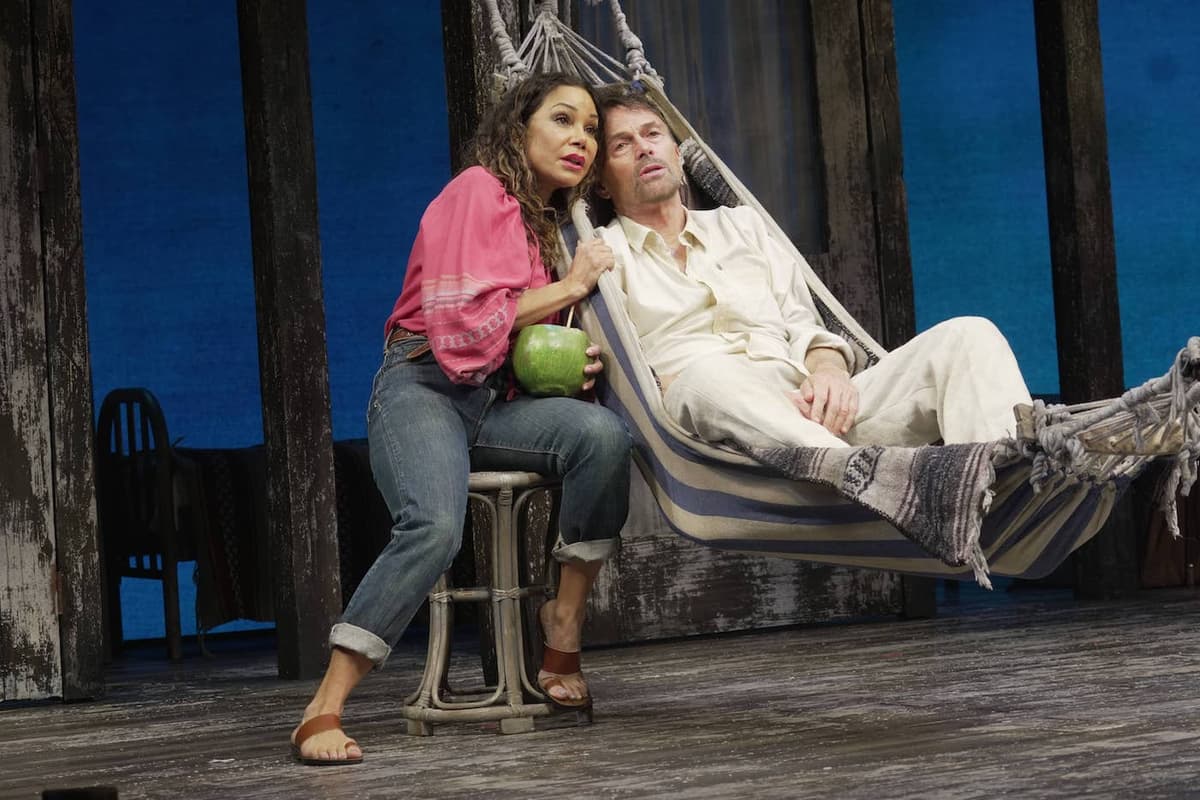Superficial Excitation Aside, Revival of Tennessee Williams’ ‘Night of the Iguana’ Fails To Triumph
Emily Mann’s production is overheated in some respects, yet also marked by an almost arid quality one doesn’t associate with Williams generally or this play in particular.

A middle-aged man with a troubled past arrives at a low-end hotel on the coast of Mexico, where he has sought refuge before. There he meets a fellow traveler, a kind and lonely woman who seems to offer him a path to salvation, but the hotel’s saucy, recently widowed proprietress and the man’s own demons get in the way.
Theater devotees will recognize this as the plot of Tennessee Williams’ “The Night of the Iguana,” as will fans of a 1964 film adaptation that starred Richard Burton, Deborah Kerr and Ava Gardner. In the original Broadway staging, produced three years before that, Bette Davis had played the hotel owner, Maxine Faulk (she was replaced after a few months by Shelley Winters), and Margaret Leighton earned a Tony Award for her turn as would-be savior Hannah Jelkes.
For the new off-Broadway production of “Iguana,” Emily Mann, an accomplished director who has extensive experience with Williams’ work, recruited several familiar, if less iconic, names — among them original “Rent” star Daphne Rubin-Vega, cast here as Maxine, and stage and screen veteran Tim Daly, who plays the protagonist, the disgraced Episcopalian reverend T. Lawrence Shannon. The company also includes such reliably supple performers as Lea DeLaria and the venerable Austin Pendleton.
Yet Ms. Mann’s revival of this juicy, albeit tricky, work is oddly prosaic — overheated in some respects, but also marked by an almost arid quality one doesn’t associate with Williams generally or this play in particular. A lack of visual atmosphere isn’t the problem: Beowulf Boritt’s evocatively shoddy set is positioned, with Jeff Croiter’s lighting, against a background of vivid blue and violet hues, with splashes of cherry, that grow deeper and darker as day turns to night and the sense of desperation among the characters intensifies.
There’s also no shortage of superficial excitation, at least, in certain performances. Ms. Rubin-Vega’s Maxine can seem both two-dimensional and overzealous, screeching and shouting her bursts of sardonic laughter like a petulant child. Ms. DeLaria contributes more indignant huffing and puffing as a vocal teacher whose prized pupil, a 16-year-old girl, was recently seduced by Shannon, whose predilection for such behavior apparently did not sit well with the church.
Williams drew Shannon, predictably, with intense sympathy; reduced to a job as tour guide for a low-grade bus company — Ms. DeLaria’s teacher and her young charge are passengers on a bus of female tourists he was supposed to have led to a more wholesome destination — he rails against the Western image of God as “a senile delinquent,” and yearns to preach his own, less orthodox ideals. (Evidence of true moral rot is provided in the play, which is set in 1940, by a visiting German couple that scampers about, singing praise to their homeland’s regime.)
Mr. Daly, now more than halfway through his sixties, has the right ravaged handsomeness for the part, and offers at least shades of the brokenness and lingering charisma required. Still, his Shannon can seem fairly pale when competing with some of the other character portraits, which can support rather too keenly Shannon’s argument that “hysteria…is the common denominator of the female nature.”
Jean Lichty’s Hannah is an exception, of course, though the actress faces other challenges in the role, that of a self-described New England spinster who gradually reveals herself to be more complex. “I thought you were sexless,” Shannon admits to her at one point, after they’ve shared certain confidences, “but you’ve suddenly turned into a woman.”
Yet with all respect to Williams, Hannah is less a woman than an amalgam of virtues, whose selflessness and chastity and refined wit and wisdom contrast sharply with Maxine’s overripe lasciviousness, so loathed by Shannon. (Much more could be said about the playwright’s depiction of sexuality in women of a certain age, here and in other works, but I won’t digress.) Ms. Lichty is graceful in the part, but it’s beyond her powers — just as it was beyond Kerr’s, and surely Leighton’s, notwithstanding the Tony — to make Hannah fully human.
It’s Mr. Pendleton who proves most affecting, as Hannah’s grandfather, a 97-year-old poet determined to defy declining cognitive powers and create one last masterpiece. In the end, his perseverance triumphs; this production, sadly, does not.

